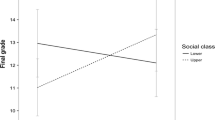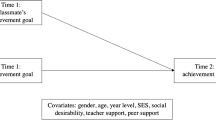Abstract
Abundant research has shown that the endorsement of performance–avoidance goals in academic contexts is associated with negative outcomes, including poor academic achievement. The present study tests students’ social class as a moderator of the relationship between performance–avoidance goals and achievement. Two hundred thirty students (106 lower-class students and 124 upper-class students, Mage = 18.57, SD = 1.28) were asked to report the highest academic degree obtained by their mother and father and complete a performance–avoidance goal scale. Participants’ initial academic level was measured. In addition, depending on the condition, they were led to believe they had great (vs. poor) chances to succeed at the university. They then solved Advanced Progressive Matrices measuring their achievement. As expected, performance–avoidance goals negatively predicted achievement only for lower-class students, and this moderation mainly appeared for high academic achievers. The manipulation of the success versus failure expectancies did not moderate the effect. These results confirm that the adoption of performance–avoidance goals would be especially deleterious for lower-class students who succeed, supporting an interpretation in terms of the upward mobility process lower-class students achieve when succeeding in higher education.


Similar content being viewed by others
Notes
We certify that all the measures and experimental conditions of the study are reported in the manuscript. The full material of this study as well as the raw data are available on Open Science Framework at osf.io/375a8.
It is worth noting that the main effect of initial ability was marginal, B = .09, t(214) = 1.81, p = .072, η 2p = .01, 95% CI [− .008, .19], the higher participants’ initial ability, the higher they tend to achieve. Furthermore, feedback interacted with initial abilities, B = − .11, t(214) = − 2.22, p = .028, η 2p = .02, 95% CI [− .21, − .01]. Simple slope analyses revealed that initial abilities positively predicted achievement in the failure feedback condition, B = .21, t(214) = 2.74, p = .007, η 2p = .03, 95% CI [.05, .35], but was not significantly related to achievement in the success feedback condition, B = − .02, t(214) < 1.
Since the reliability of the performance-avoidance goal score is quite low, in supplementary analyses, a global avoidance score was computed. This score aggregated the performance-avoidance and other-avoidance goal items (α = .73, M = 3.96, SD = 1.08). Then, the same regression model as before, but replacing performance–avoidance or other-avoidance goals by the global avoidance goal score was conducted. The main effect of performance-avoidance goals was significant, B = − .19, t(214) = − 2.34, p = .020. In addition, although performance-avoidance goals did not significantly interact with social class, B = .12, t(214) = 1.54, p = .13, the 3-way interaction between social class, initial academic abilities, and performance avoidance-goals was significant, B = .14, t(214) = 2.84, p = .005. Just like for performance–avoidance goals, the moderation of the effect of performance–avoidance goals by students’ social class was significant for high academic achievers (i.e., one standard deviation above the mean), B = .36, t(214) = 2.98, p = .003, but was not significant for low academic achievers (i.e., one standard deviation below the mean), B = − .12, t(214) = − 1.05, p = .29.
References
Amiot, C. E., Terry, D. J., Wirawan, D., & Grice, T. A. (2010). Changes in social identities over time: The role of coping and adaptation processes. British Journal of Social Psychology, 49(4), 803–826. https://doi.org/10.1348/014466609X480624.
Arthur, W., Jr., & Day, D. V. (1994). Development of a short form for the Raven Advanced Progressive Matrices Test. Educational and Psychological Measurement, 54(2), 394–403. https://doi.org/10.1177/0013164494054002013.
Barron, K. E., & Harackiewicz, J. M. (2001). Achievement goals and optimal motivation: Testing multiple goal models. Journal of Personality and Social Psychology, 80(5), 706–722. https://doi.org/10.1037//0022-3514.80.5.706.
Barron, K. E., & Harackiewicz, J. M. (2003). Revisiting the benefits of performance–approach goals in the college classroom: Exploring the role of goals in advanced college courses. International Journal of Educational Research, 39(4–5), 357–374. https://doi.org/10.1016/j.ijer.2004.06.004.
Brodish, A. B., & Devine, P. G. (2009). The role of performance–avoidance goals and worry in mediating the relationship between stereotype threat and performance. Journal of Experimental Social Psychology, 45(1), 180–185. https://doi.org/10.1016/j.jesp.2008.08.005.
Chalabaev, A., Major, B., Cury, F., & Sarrazin, P. (2009). Physiological markers of challenge and threat mediate the effects of performance-based goals on performance. Journal of Experimental Social Psychology, 45(4), 991–994. https://doi.org/10.1016/j.jesp.2009.04.009.
Chalabaev, A., Major, B., Sarrazin, P., & Cury, F. (2012). When avoiding failure improves performance: Stereotype threat and the impact of performance goals. Motivation and Emotion, 36(2), 130–142. https://doi.org/10.1007/s11031-011-9241-x.
Chen, E., & Matthews, K. A. (2001). Cognitive appraisal biases: An approach to understanding the relation between socioeconomic status and cardiovascular reactivity in children. Annals of Behavioral Medicine, 23(2), 101–111. https://doi.org/10.1207/S15324796ABM2302_4.
Coutinho, S. A., & Neuman, G. (2008). A model of metacognition, achievement goal orientation, learning style and self-efficacy. Learning Environments Research, 11(2), 131–151. https://doi.org/10.1007/s10984-008-9042-7.
Croizet, J. C., & Claire, T. (1998). Extending the concept of stereotype threat to social class: The intellectual underperformance of students from low socioeconomic backgrounds. Personality and Social Psychology Bulletin, 24(6), 588–594. https://doi.org/10.1177/0146167298246003.
Darnon, B., & Butera, F. (2005). Buts d’accomplissement, stratégies d’étude, et motivation intrinsèque: présentation d’un domaine de recherche et validation française de l’échelle d’Elliot et McGregor (2001) [Achievement goals, study strategies, and intrinsic motivation: Presenting a domain of research and the French validation of Elliot and McGregor’s (2001) scale]. L’Année Psychologique, 105, 105–131. https://doi.org/10.3406/psy.2005.3821.
Darnon, C., Butera, F., Mugny, G., Quiamzade, A., & Hulleman, C. S. (2009). “Too complex for me!” Why do performance–approach and performance–avoidance goals predict exam performance? European Journal of Psychology of Education, 24(4), 423. https://doi.org/10.1007/BF03178759.
Darnon, C., Jury, M., & Aelenei, C. (2018). Who benefits from mastery–approach and performance–approach goals in college? Students’ social class as a moderator of the link between goals and grade. European Journal of Psychology of Education, 33(4), 713–726. https://doi.org/10.1007/s10212-017-0351-z.
Deemer, E. D., Smith, J. L., Carroll, A. N., & Carpenter, J. P. (2014). Academic procrastination in STEM: Interactive effects of stereotype threat and achievement goals. The Career Development Quarterly, 62(2), 143–155. https://doi.org/10.1002/j.2161-0045.2014.00076.x.
DeRosa, E., & Dolby, N. (2014). “I don’t think the university knows me.”: Institutional culture and lower-income, first-generation college students. InterActions: UCLA Journal of Education and Information Studies, 10(2). Retrieved from https://escholarship.org/uc/item/0kj6m6r8.
Destin, M., & Debrosse, R. (2017). Upward social mobility and identity. Current Opinion in Psychology, 18, 99–104. https://doi.org/10.1016/j.copsyc.2017.08.006.
Dickhäuser, C., Buch, S. R., & Dickhäuser, O. (2011). Achievement after failure: The role of achievement goals and negative self-related thoughts. Learning and Instruction, 21(1), 152–162. https://doi.org/10.1016/j.learninstruc.2010.01.002.
Dompnier, B., Darnon, C., & Butera, F. (2013). When performance–approach goals predict academic achievement and when they do not: A social value approach. British Journal of Social Psychology, 52(3), 587–596. https://doi.org/10.1111/bjso.12025.
Durante, F., Tablante, C. B., & Fiske, S. T. (2017). Poor but warm, rich but cold (and competent): Social classes in the stereotype content model. Journal of Social Issues, 73(1), 138–157. https://doi.org/10.1111/josi.12208.
Durik, A. M., Lovejoy, C. M., & Johnson, S. J. (2009). A longitudinal study of achievement goals for college in general: Predicting cumulative GPA and diversity in course selection. Contemporary Educational Psychology, 34(2), 113–119. https://doi.org/10.1016/j.cedpsych.2008.11.002.
Dweck, C. S. (1986). Motivational processes affecting learning. American Psychologist, 41(10), 1040–1048. https://doi.org/10.1037/0003-066X.41.10.1040.
Elliot, A. J. (1999). Approach and avoidance motivation and achievement goals. Educational Psychologist, 34(3), 169–189. https://doi.org/10.1207/s15326985ep3403_3.
Elliot, A. J., & Church, M. A. (1997). A hierarchical model of approach and avoidance achievement motivation. Journal of Personality and Social Psychology, 72(1), 218–232. https://doi.org/10.1037/0022-3514.72.1.218.
Elliot, A. J., & Harackiewicz, J. M. (1996). Approach and avoidance achievement goals and intrinsic motivation: A mediational analysis. Journal of Personality and Social Psychology, 70(3), 461–475. https://doi.org/10.1037/0022-3514.70.3.461.
Elliot, A. J., & McGregor, H. A. (2001). A 2 × 2 achievement goal framework. Journal of Personality and Social Psychology, 80(3), 501. https://doi.org/10.1037/0022-3514.80.3.501.
Elliot, A. J., & Murayama, K. (2008). On the measurement of achievement goals: Critique, illustration, and application. Journal of Educational Psychology, 100(3), 613–628. https://doi.org/10.1037/0022-0663.100.3.613.
Elliot, A. J., Murayama, K., & Pekrun, R. (2011). A 3 × 2 achievement goal model. Journal of Educational Psychology, 103(3), 632–648. https://doi.org/10.1037/a0023952.
Elliott, E. S., & Dweck, C. S. (1988). Goals: An approach to motivation and achievement. Journal of Personality and Social Psychology, 54(1), 5–12. https://doi.org/10.1037/0022-3514.54.1.5.
Fiske, S. T., Cuddy, A. J., Glick, P., & Xu, J. (2002). A model of (often mixed) stereotype content: competence and warmth respectively follow from perceived status and competition. Journal of Personality and Social Psychology, 82(6), 878–902. https://doi.org/10.1037//0022-3514.82.6.878.
Goudeau, S., & Croizet, J. C. (2017). Hidden advantages and disadvantages of social class: How classroom settings reproduce social inequality by staging unfair comparison. Psychological Science, 28(2), 162–170. https://doi.org/10.1177/0956797616676600.
Grant, H., & Dweck, C. S. (2003). Clarifying achievement goals and their impact. Journal of Personality and Social Psychology, 85(3), 541–553. https://doi.org/10.1037/0022-3514.85.3.541.
Halabi, S., Dovidio, J. F., & Nadler, A. (2008). When and how do high status group members offer help: Effects of social dominance orientation and status threat. Political Psychology, 29(6), 841–858. https://doi.org/10.1111/j.1467-9221.2008.00669.x.
Harackiewicz, J. M., Barron, K. E., Pintrich, P. R., Elliot, A. J., & Thrash, T. M. (2002a). Revision of achievement goal theory: Necessary and illuminating. Journal of Educational Psychology, 94(3), 638–645. https://doi.org/10.1037/0022-0663.94.3.638.
Harackiewicz, J. M., Barron, K. E., Tauer, J. M., Carter, S. M., & Elliot, A. J. (2000). Short-term and long-term consequences of achievement goals: Predicting interest and performance over time. Journal of Educational Psychology, 92(2), 316–330. https://doi.org/10.1037/0022-0663.92.2.316.
Harackiewicz, J. M., Barron, K. E., Tauer, J. M., & Elliot, A. J. (2002b). Predicting success in college: A longitudinal study of achievement goals and ability measures as predictors of interest and performance from freshman year through graduation. Journal of Educational Psychology, 94(3), 562–575. https://doi.org/10.1037/0022-0663.94.3.562.
Howell, A. J., & Watson, D. C. (2007). Procrastination: Associations with achievement goal orientation and learning strategies. Personality and Individual Differences, 43(1), 167–178. https://doi.org/10.1016/j.paid.2006.11.017.
Huang, C. (2012). Discriminant and criterion-related validity of achievement goals in predicting academic achievement: A meta-analysis. Journal of Educational Psychology, 104(1), 48–73. https://doi.org/10.1037/a0026223.
Hulleman, C. S., Schrager, S. M., Bodmann, S. M., & Harackiewicz, J. M. (2010). A meta-analytic review of achievement goal measures: Different labels for the same constructs or different constructs with similar labels? Psychological Bulletin, 136(3), 422–449. https://doi.org/10.1037/a0018947.
Ivcevic, Z., & Kaufman, J. C. (2013). The can and cannot do attitude: How self-estimates of ability vary across ethnic and socioeconomic groups. Learning and Individual Differences, 27, 144–148. https://doi.org/10.1016/j.lindif.2013.07.011.
Jetten, J., Iyer, A., Tsivrikos, D., & Young, B. M. (2008). When is individual mobility costly? The role of economic and social identity factors. European Journal of Social Psychology, 38(5), 866–879. https://doi.org/10.1002/ejsp.471.
Jost, J. T., Gaucher, D., & Stern, C. (2015). The world isn’t fair”: A system justification perspective on social stratification and inequality. APA Handbook of Personality and Social Psychology, 2, 317–340. https://doi.org/10.1037/14342-012.
Jury, M., Bruno, A., & Darnon, C. (2018). Doing better (or worse) than one’s parents: Social status, mobility, and performance–avoidance goals. British Journal of Educational Psychology, 88(4), 659–674. https://doi.org/10.1111/bjep.12210.
Jury, M., Smeding, A., Court, M., & Darnon, C. (2015). When first-generation students succeed at university: On the link between social class, academic performance, and performance–avoidance goals. Contemporary Educational Psychology, 41, 25–36. https://doi.org/10.1016/j.cedpsych.2014.11.001.
Jury, M., Smeding, A., Stephens, N. M., Nelson, J. E., Aelenei, C., & Darnon, C. (2017). The experience of low SES students in Higher Education: Psychological barriers to success and interventions to reduce social-class inequality. Journal of Social Issues, 73(1), 23–41. https://doi.org/10.1111/josi.12202.
Kaplan, A., & Middleton, M. J. (2002). Should childhood be a journey of a race? Response to Harackiewicz et al. (2002). Journal of Educational Psychology, 94, 646–648. https://doi.org/10.1037/0022-0663.94.3.646.
Karabenick, S. A. (2003). Seeking help in large college classes: A person-centered approach. Contemporary Educational Psychology, 28(1), 37–58. https://doi.org/10.1016/S0361-476X(02)00012-7.
Karabenick, S. A. (2004). Perceived achievement goal structure and college student help seeking. Journal of Educational Psychology, 96(3), 569–581. https://doi.org/10.1037/0022-0663.96.3.569.
Keys, T. D., Conley, A. M., Duncan, G. J., & Domina, T. (2012). The role of goal orientations for adolescent mathematics achievement. Contemporary Educational Psychology, 37(1), 47–54. https://doi.org/10.1016/j.cedpsych.2011.09.002.
King, R. B. (2016). Is a performance–avoidance achievement goal always maladaptive? Not necessarily for collectivists. Personality and Individual Differences, 99, 190–195. https://doi.org/10.1016/j.paid.2016.04.093.
Kraus, M. W., Horberg, E. J., Goetz, J. L., & Keltner, D. (2011). Social class rank, threat vigilance, and hostile reactivity. Personality and Social Psychology Bulletin, 37(10), 1376–1388. https://doi.org/10.1016/j.paid.2016.04.093.
Kraus, M. W., Piff, P. K., Mendoza-Denton, R., Rheinschmidt, M. L., & Keltner, D. (2012). Social class, solipsism, and contextualism: How the rich are different from the poor. Psychological Review, 119(3), 546–572. https://doi.org/10.1037/a0028756.
Kraus, M. W., & Stephens, N. M. (2012). A road map for an emerging psychology of social class. Social and Personality Psychology Compass, 6(9), 642–656. https://doi.org/10.1111/j.1751-9004.2012.00453.x.
Kudrna, L., Furnham, A., & Swami, V. (2010). The influence of social class salience on self-assessed intelligence. Social Behavior and Personality: An International Journal, 38(6), 859–864. https://doi.org/10.2224/sbp.2010.38.6.859.
Levin, S., Federico, C. M., Sidanius, J., & Rabinowitz, J. L. (2002). Social dominance orientation and intergroup bias: The legitimation of favoritism for high-status groups. Personality and Social Psychology Bulletin, 28(2), 144–157. https://doi.org/10.1177/0146167202282002.
Linnenbrink-Garcia, L., Tyson, D. F., & Patall, E. A. (2008). When are achievement goal orientations beneficial for academic achievement? A closer look at main effects and moderating factors. International Review of Social Psychology, 21(1), 19–70.
Lovejoy, C. M., & Durik, A. M. (2010). Self-handicapping: The interplay between self-set and assigned achievement goals. Motivation and Emotion, 34(3), 242–252. https://doi.org/10.1007/s11031-010-9179-4.
Meece, J. L., Anderman, E. M., & Anderman, L. H. (2006). Classroom goal structure, student motivation, and academic achievement. Annual Review of Psychology, 57, 487–503. https://doi.org/10.1146/annurev.psych.56.091103.070258.
Midgley, C., Kaplan, A., & Middleton, M. (2001). Performance–approach goals: Good for what, for whom, under what circumstances, and at what cost? Journal of Educational Psychology, 93(1), 77. https://doi.org/10.1037/0022-0663.93.1.77.
Moller, A. C., & Elliot, A. J. (2006). The 2 × 2 achievement goal framework: An overview of empirical research. In A. Mittel (Ed.), Focus on educational psychology (pp. 307–326). Hauppauge, NY: Nova Science Publishers Inc.
Ostrove, J. M., & Long, S. M. (2007). Social class and belonging: Implications for college adjustment. The Review of Higher Education, 30(4), 363–389. https://doi.org/10.1353/rhe.2007.0028.
Poortvliet, P. M., & Darnon, C. (2010). Toward a more social understanding of achievement goals: The interpersonal effects of mastery and performance goals. Current Directions in Psychological Science, 19(5), 324–328. https://doi.org/10.1177/0963721410383246.
Ramos-Sánchez, L., & Nichols, L. (2007). Self-efficacy of first-generation and non-first-generation college students: The relationship with academic performance and college adjustment. Journal of College Counseling, 10(1), 6–18. https://doi.org/10.1002/j.2161-1882.2007.tb00002.x.
Roussel, P., Elliot, A. J., & Feltman, R. (2011). The influence of achievement goals and social goals on help-seeking from peers in an academic context. Learning and Instruction, 21(3), 394–402. https://doi.org/10.1016/j.learninstruc.2010.05.003.
Rubin, M. (2012). Working-class students need more friends at university: A cautionary note for Australia’s higher education equity initiative. Higher Education Research & Development, 31(3), 431–433. https://doi.org/10.1080/07294360.2012.689246.
Senko, C., & Harackiewicz, J. M. (2005). Regulation of achievement goals: The role of competence feedback. Journal of Educational Psychology, 97(3), 320–336. https://doi.org/10.1037/0022-0663.97.3.320.
Stephens, N. M., Brannon, T. N., Markus, H. R., & Nelson, J. E. (2015). Feeling at home in college: Fortifying school-relevant selves to reduce social class disparities in higher education. Social Issues and Policy Review, 9(1), 1–24. https://doi.org/10.1111/sipr.12008.
Stephens, N. M., Fryberg, S. A., Markus, H. R., Johnson, C. S., & Covarrubias, R. (2012). Unseen disadvantage: How American universities’ focus on independence undermines the academic performance of first-generation college students. Journal of Personality and Social Psychology, 102(6), 1178–1197. https://doi.org/10.1037/a0027143.
Urdan, T. (2004). Predictors of academic self-handicapping and achievement: Examining achievement goals, classroom goal structures, and culture. Journal of Educational Psychology, 96(2), 251–264. https://doi.org/10.1037/0022-0663.96.2.251.
Van Yperen, N. W., Blaga, M., & Postmes, T. (2014). A meta-analysis of self-reported achievement goals and nonself-report performance across three achievement domains (work, sports, and education). PLoS ONE, 9(4), e93594. https://doi.org/10.1371/journal.pone.0093594.
Van Yperen, N. W., Blaga, M., & Postmes, T. (2015). A meta-analysis of the impact of situationally induced achievement goals on task performance. Human Performance, 28(2), 165–182. https://doi.org/10.1080/08959285.2015.1006772.
Acknowledgements
This research was supported by the Conseil Régional Auvergne Rhône Alpes.
Author information
Authors and Affiliations
Corresponding author
Ethics declarations
Conflict of interest
The authors declare that there are no potential conflicts of interest with respect to the research, authorship, and/or publication of this article.
Additional information
Publisher's Note
Springer Nature remains neutral with regard to jurisdictional claims in published maps and institutional affiliations.
Rights and permissions
About this article
Cite this article
Bruno, A., Jury, M., Toczek-Capelle, MC. et al. Are performance–avoidance goals always deleterious for academic achievement in college? The moderating role of social class. Soc Psychol Educ 22, 539–555 (2019). https://doi.org/10.1007/s11218-019-09480-y
Received:
Accepted:
Published:
Issue Date:
DOI: https://doi.org/10.1007/s11218-019-09480-y




